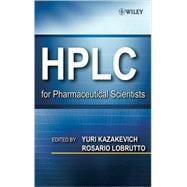
Dr. ROSARIO LOBRUTTO has over thirteen years of experience in the pharmaceutical industry working both with drug substances and drug products. He is a Group Head in the Pharmaceutical and Analytical Development Department at Novartis Pharmaceuticals Corporation managing multiple early to late phase projects for both small drug molecules and proteins/peptides and is responsible for teaching in-house HPLC method development training. Dr. LoBrutto is the author of twenty research articles, fifty presentations, and five book chapters in different areas of analytical/physical chemistry and has served as an adjunct professor for seven years. Dr. LoBrutto's main research directions include HPLC retention mechanisms, the influence of mobile phase modifiers on analyte retention and chromatographic figures of merit, and method development strategies for small molecules and proteins/peptides.
| Preface | |
| Contributors | |
| HPLC Theory and Practice | |
| Introduction | |
| Chromatography in the Pharmaceutical World | |
| Chromatographic Process | |
| Classification | |
| History of Discovery and Early Development (1903-1933) | |
| General Separation Process | |
| Types of HPLC | |
| HPLC Descriptors (Vr, k, N, etc.) | |
| HPLC Theory | |
| Introduction | |
| Basic Chromatographic Descriptors | |
| Efficiency | |
| Resolution | |
| HPLC Retention | |
| Retention Mechanism | |
| General Column Mass Balance | |
| Partitioning Model | |
| Adsorption Model | |
| Total and Excess Adsorption | |
| Mass Balance in Adsorption Model | |
| Adsorption of the Eluent Components | |
| Void Volume Considerations | |
| Thermodynamic Relationships | |
| Adsorption-Partitioning Retention Mechanism | |
| Secondary Equilibria | |
| Gradient Elution Principles | |
| Types of Analyte Interactions with the Stationary Phase | |
| Conclusion | |
| Stationary Phases | |
| Introduction | |
| Type of Packing Material (Porous, Nonporous, Monolithic) | |
| Base Material (Silica, Zirconia, Alumina, Polymers) | |
| Geometry | |
| Adsorbent Surface Chemistry | |
| Surface of Chemically Modified Material | |
| Polymer-Based Adsorbents | |
| Stationary Phases for Chiral Separations | |
| Columns | |
| Reversed-Phase HPLC | |
| Introduction | |
| Retention in Reversed-Phase HPLC | |
| Stationary Phases for RPLC | |
| Mobile Phases for RPLC | |
| pH Effect on HPLC Separations | |
| Effect of Organic Eluent Composition on Analyte Ionization | |
| Synergistic Effect of pH, Organic Eluent, and Temperature on Ionizable Analyte Retention and Selectivity | |
| Examples of Applying pH Shift and Analyte pKa Shift Rules | |
| Effect of Temperature on Analyte Ionization | |
| Ion-Interaction Chromatography | |
| Concluding Remarks | |
| Normal-Phase HPLC | |
| Introduction | |
| Theory of Retention in Normal-Phase Chromatography | |
| Effect of Mobile Phase on Retention | |
| Selectivity | |
| Applications | |
| Conclusions | |
| Size-Exclusion Chromatography | |
| Separation of the Analyte Molecules by Their Size | |
| Molecular Size and Molecular Weight | |
| Separation Mechanism | |
| Calibration | |
| Columns | |
| Molecular Weight Distribution | |
| Effect of Eluent | |
| Effect of Temperature | |
| Detectors | |
| Solving Mass Balance Issues | |
| Aqueous SEC Applications | |
| LC/MS: Theory, Instrumentation, and Applications to Small Molecules | |
| Introduction | |
| Ionization Methods and LC/MS Interfaces | |
| Mass Analyzers | |
| Role of Instrumental Parameters on Ionization Efficiency in LC/MS | |
| Effect of Mobile-Phase Composition on Ionization Efficiency in LC/MS | |
| MS Interpretation | |
| Practical Applications | |
| Conclusions | |
| Method Development | |
| Introduction | |
| Types of Methods | |
| Defining the Method | |
| Method Development Considerations | |
| Method Development Approaches | |
| Effect of pH on UV Absorbance | |
| Analyte pKa-From an Analytical Chemist's Perspective | |
| Reversed-Phase Versus Normal-Phase Separations | |
| Instrument/System Consi | |
| Table of Contents provided by Publisher. All Rights Reserved. |
The New copy of this book will include any supplemental materials advertised. Please check the title of the book to determine if it should include any access cards, study guides, lab manuals, CDs, etc.
The Used, Rental and eBook copies of this book are not guaranteed to include any supplemental materials. Typically, only the book itself is included. This is true even if the title states it includes any access cards, study guides, lab manuals, CDs, etc.